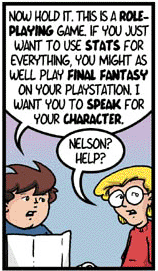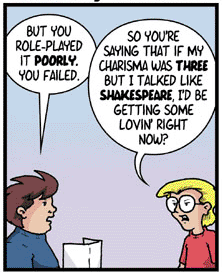Into the Odd, and Pretend Intelligence
Into the Odd is at once an homage to and a departure from the classic RPGs of the 70s and 80s. In the game, to quote the book: “You are an Explorer, braving the unknown in search of riches, fame, knowledge and power. Most of all, you seek Arcana, strange devices hosting unnatural powers beyond technology. They range from the smallest ring to vast machines.”
The system itself does a lot of very interesting things, but rather than give a full system breakdown, what I want to talk about is how Into the Odd handles stats.
Into the Odd has done away with skills, making every risky action contingent on your three stats: Strength, Dexterity, and Willpower. I won’t condescend to explain what Str, Dex, and Wil do in-game, save to note that there is no Intelligence stat. This isn’t the only system that has gotten rid of intelligence as a stat: Endless Lands is one example, as is Blades in the Dark, Lancer, Cairn, etc.
But most systems keep it. Intelligence has been a mainstay in RPGs since D&D, which is frankly a misread. The stat should have been called “magic,” because in the early days of D&D there was no other use for the intelligence stat except to influence spells. Even in today’s D&D the stat is a favored dump stat for characters with no arcane magic.
But in equating the stat to Intelligence, RPGs created the worst stat. I don’t care if you call it “mind” or “wits” or “mirrors,” it’s just bad.
Allow me to explain: what is “intelligence?”
Am I really going to try and pull a Socrates on something so simple and self-evident? Really, I don’t need to think this hard about everything, do I?
Yes. Yes I do. My brain works differently.
Shaun explains in his introduction to The Bell Curve that Intelligence is a nebulous term that could apply to nearly anything. Everything. Intelligence isn’t just education; it’s creativity, memory, wit, perception, analysis, applied skill, training, and more, all wrapped up into one. Is knowing when to pass or shoot in basketball “intelligence?” How about knowing how to write a good book? Compose a hit song? Knowing the right thing to say?
A single intelligence stat, on the other hand, represents how “good” someone is at “thinking.”
Some systems have shifted towards Education as a stat, which runs into the problem that it’s kind of a superfluous stat when you can also have skills that detail what a persona is educated in. A genius brain-surgeon may know next to nothing about auto-repair, and a wizard doesn’t necessarily know anything about war-strategy. To paraphrase the Leftist Cooks: “There are people who think J. D. Salinger was smarter than Jim Henson, and I respectfully disagree.”
But even accepting that intelligence is a shaky concept at best, the second and far more interesting problem with intelligence is one of application.
I don’t know about you, but I’m not very strong. I mean, I couldn’t swing a broadsword to save my life; engage in prolonged combat, forget it! But Thug the Barbarian is very strong. They can swing heavy battleaxes all day long and love doing it. Now, I’m not Thug, but I am playing as Thug. While I am not strong, I am, in fact, “pretend strong.”
Now what if I’m playing a wizard? Intelligence score through the roof, comparable to Sherlock Holmes, Batman, and Einstein all wrapped up in one. I am “pretend intelligent.”
In RPGs, physical action is imagined. There is no ogre, no goblin, no door to break down outside of our imagination. I can say I break down the door, because the dice decided that my strength number was good enough. It’s all imaginary.

On the other hand, my mind isn’t imagined; it’s how I engage with the fantasy. Puzzles, conversations, strategies…if I’m playing a genius, I need to come up with genius plans, genius answers, and genius asides.
If I’m not strong, it doesn’t matter, the world isn’t real. If I’m not smart, can I play a smart character?
It goes beyond Intelligence, of course; it ties into every mental “stat” you can think of; but now we’re getting into the question of Player/character synchronization. Characters may think differently than their players. Can a reckless player roleplay a steady and cautious space-captain? Can an anxious player embody an overconfident spy? Are our personas more defined by the players who play them, or the character sheets as written?
Not allowing stats to override player input means we are locked into ourselves — unable to play people more charming or intelligent than ourselves.
There is one view of RPGs that responds: That’s right, you can’t play someone who is smarter than you, any more than you could roll up a better combat strategy in Warhammer 40k. You have to come up with something to say. You have to figure out the puzzle, study the crime scene, work out the details and solve the problems on your own. It’s you that is being tested in an RPG, not your character. You can’t just “roll to win.”

But that only goes so far: I’m not as educated as my scientist character, so if I come across a laboratory, do I need to rely on my memory of high-school chemistry? Do you expect me to remember the chemical composition of sulfuric acid on my own, when clearly if my character is a chemical scientist, they should know?
Of course not, that would be absurd. Your character knows things that you don’t, and can figure out things that you can’t…so a puzzle based on atomic weights would be easily solved by a head scientist, while I would struggle.
So Intelligence should be used in the same manner as Strength is used for breaking down doors, right? If we find ourselves in front of a puzzle, we can roll our Intelligence to see if we solve the puzzle. It’s the same kind of obstacle, just a different shaped lock.
One view of RPGs is that this maintains verisimilitude. A genius wizard might be able to solve a puzzle in moments, but if the player can’t, then the solving has to happen mechanically. This is how someone who plays a bard can write poetry, a soldier can effectively maintain their equipment, or a detective analyzes blood splatters.
But here’s the next step of the Intelligence Stat kerfuffle: Intelligence in RPGs is an illusion. Sherlock Holmes is intelligent, yes? We know he is. We’ve seen him be intelligent, and that’s the core trick of intelligence in narrative: people are only smart if they’re right. Sherlock is smart because Doyle wrote him to be correct.
This makes intelligence as a roleplaying concept quite interesting: You could, if you so chose, have a player come up with a plan of their own design to thwart the spy or trick the clever thief, and if their intelligence roll succeeds then so does the plan. You could take it a step further and say that a successful intelligence roll will dictate whether their theory about the bad-guy’s motivations or plans are correct or not. You could change an NPCs motivations and goals based on what the high-intelligence character says.
This may seem absurd to you, but is it any more absurd than changing the course of a campaign if Thug doesn’t manage to break down the door before the villain escapes?
The truth of RPGs is that we want our characters to be capable. If they are brave or strong, we want to feel brave or strong. I don’t think wanting to fantasize being a genius is any less respectable than pretending you’re a superhero or mech pilot, and nor do I think that players who don’t want the game to mechanize their intelligence are somehow rejecting narrative in favor of strategy wargaming.
I do think, however, that it’s a good idea for you and your fellow players to discuss the uses and limitations of intelligence stats in your game, to say nothing of the question about whether it’s you or the character who is being tested.
Ah. Hm. That word. Tested.
Once more we run afoul of the game/story spectrum. What if the game isn’t about being tested? Remember when I mentioned overcoming an “Orc’s Strength” in the last post? What if the game isn’t about numbers, but about a story?
Next time, let’s look at stats that have been created to work narratively.